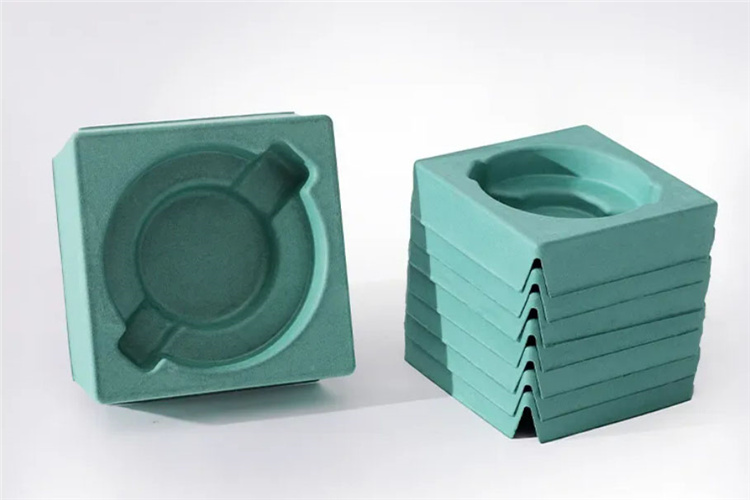How Molded Pulp Packaging Can Improve Your Corporate Social Responsibility (CSR)
In today’s eco-conscious world, Corporate Social Responsibility (CSR) is more than just a buzzword; it’s a vital component of any successful business strategy. Companies are increasingly held accountable for their environmental impact and are expected to take proactive steps to minimize it.
One effective way to enhance your CSR efforts is by adopting molded pulp packaging. This sustainable packaging solution not only benefits the environment but also bolsters your company’s image and operational efficiency.
In this article, we’ll explore how molded pulp packaging can improve your CSR.

What is Molded Pulp Packaging?
Molded pulp packaging, also known as molded fiber packaging, is made from recycled paperboard and newsprint. It’s biodegradable, compostable, and recyclable, making it an eco-friendly alternative to traditional packaging materials like plastic and Styrofoam.
Commonly used for packaging electronics, food, and industrial products, molded pulp is known for its durability and protective properties.
Environmental Benefits of Molded Pulp Packaging
1. Reducing Waste
Molded pulp packaging is made from recycled materials, which means it helps reduce the amount of waste that ends up in landfills. By choosing molded pulp, your company can contribute to a circular economy, where materials are reused and recycled, minimizing the need for virgin resources.
2. Lowering Carbon Footprint
The production process of molded pulp packaging consumes less energy and produces fewer carbon emissions compared to plastic production. This reduction in energy usage translates to a lower carbon footprint for your company, aligning with global efforts to combat climate change.
3. Biodegradability and Compostability
One of the standout features of molded pulp packaging is its biodegradability. Unlike plastic, which can take hundreds of years to decompose, molded pulp breaks down naturally within a few months. This compostability ensures that even if the packaging does end up in a landfill, it won’t contribute to long-term environmental pollution.

Enhancing Corporate Image
1. Demonstrating Commitment to Sustainability
Adopting molded pulp packaging sends a strong message to your customers, stakeholders, and the public that your company is committed to sustainability. It shows that you are taking tangible steps to reduce your environmental impact, which can enhance your corporate reputation and attract eco-conscious consumers.
2. Building Customer Loyalty
Today’s consumers are more informed and concerned about environmental issues than ever before. By using sustainable packaging, you can build stronger relationships with customers who prioritize eco-friendly practices. This commitment to sustainability can lead to increased customer loyalty and brand advocacy.
3. Standing Out in the Market
In a competitive market, differentiating your brand is crucial. Molded pulp packaging can help your products stand out on the shelves and online by highlighting your commitment to environmental stewardship. This unique selling proposition can be a deciding factor for consumers when choosing between your products and those of competitors.

Operational Efficiency and Cost Savings
1. Reduced Material Costs
While the initial investment in sustainable packaging might be higher, the long-term cost savings can be substantial. Molded pulp packaging is lightweight, which can reduce shipping costs. Additionally, its protective qualities can minimize product damage and returns, leading to cost savings in the long run.
2. Streamlined Supply Chain
Molded pulp packaging can be custom-designed to fit your products perfectly, reducing the need for excess packaging materials. This efficiency can streamline your supply chain, reduce storage space requirements, and lower transportation costs.
3. Compliance with Regulations
Many regions are implementing stricter regulations on packaging materials, particularly plastics. By transitioning to molded pulp packaging, your company can stay ahead of these regulations and avoid potential fines or compliance issues. This proactive approach demonstrates your commitment to environmental responsibility and can save you from future regulatory headaches.
Case Studies and Success Stories
1. Apple’s Sustainable Packaging
Apple has been a leader in adopting sustainable packaging solutions. The company has significantly reduced its use of plastics and introduced molded pulp packaging for many of its products. This shift not only supports Apple’s CSR goals but also resonates with its environmentally conscious customer base.
2. Dell’s Eco-Friendly Packaging
Dell has also embraced molded pulp packaging as part of its sustainability initiatives. By using this eco-friendly material, Dell has been able to reduce its carbon footprint and improve its overall environmental performance. The company’s commitment to sustainable packaging has been well-received by customers and industry experts alike.

Implementing Molded Pulp Packaging in Your Business
1. Assess Your Packaging Needs
The first step in transitioning to molded pulp packaging is to assess your current packaging needs. Identify the products that can be packaged using molded pulp and evaluate the potential benefits and cost savings.
2. Partner with a Reputable Supplier
Choosing the right supplier is crucial for a successful transition to molded pulp packaging. Look for suppliers with a proven track record in producing high-quality, sustainable packaging solutions. BonitoPak, for example, offers a wide range of molded pulp packaging options tailored to meet your specific needs.
3. Educate Your Stakeholders
It’s important to communicate the benefits of molded pulp packaging to your stakeholders, including employees, customers, and investors. Educating them about the environmental and operational advantages can help garner support for the transition and highlight your company’s commitment to CSR.
4. Monitor and Report Progress
Once you’ve implemented molded pulp packaging, it’s essential to monitor its impact and report your progress. Track metrics such as waste reduction, cost savings, and customer feedback to measure the success of your efforts. Sharing these results in your CSR reports can further enhance your corporate image and demonstrate transparency.
Conclusion
Incorporating molded pulp packaging into your business strategy is a powerful way to improve your Corporate Social Responsibility. This sustainable packaging solution not only benefits the environment but also enhances your corporate image, builds customer loyalty, and improves operational efficiency. By taking proactive steps to reduce your environmental impact, you can position your company as a leader in sustainability and make a positive contribution to the planet.
Choose BonitoPak for your molded pulp packaging needs and take a significant step towards a greener future.




